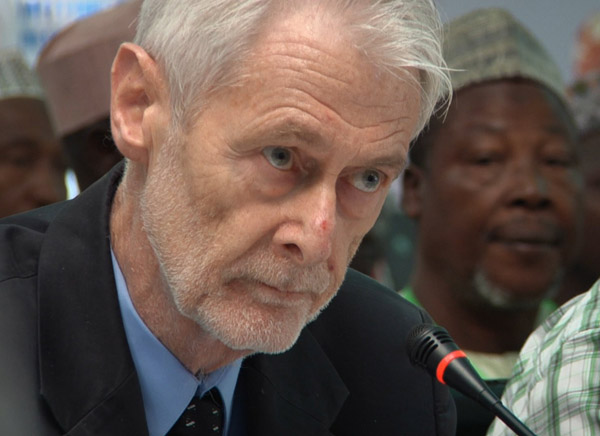Some people live for their work, while the main subject of this poignant documentary is still living thanks to it. Padraig O’Malley, an international conflict mediator, travels to hot spots around the globe, attempting to build bridges among violent factions. From the very beginning, it’s evident that he’s effective at his job. In footage from a 2012 meeting in Kirkuk, Iraq, between representatives of paramilitary forces, he single-handedly stops the various sides from walking away from the table.
The film celebrates O’Malley’s career, which is in its twilight, but also examines how he got this far through a pattern of meeting conflict head-on. Director James Demo chronicles his rise on the world stage, starting with brazenly bringing together paramilitary leaders from Northern Ireland during the 1970s, when the Troubles were at their worst. It’s remembered decades later as a turning point toward peace, and he followed it by organizing the Forum for Cities in Transition, which regularly brings together political operatives from societies collapsing from violence, as well as ones that previously fell but have come back.
The early scenes reveal O’Malley engaging with conference attendees, giving speeches, and otherwise cutting a formidable figure. But then the narrative follows him to a quiet bar on a lonely street in Cambridge, Massachusetts, where a very different side of O’Malley steps into view. Secrets are revealed: he has experienced depression, alcoholism, and other self-destructive impulses. Further, he didn’t become involved in the Troubles out of a sense of altruism but as a last-ditch attempt to halt his own fall into an abyss.
The Peacemaker is a compelling portrait of a man who managed to fight off his personal demons for decades by facing down other people’s conflicts instead. The film raises the question: What did he gain from such an approach to life, and what did he lose? With the former, O’Malley got an endless supply of reasons not to deal with his personal issues, as more conflicts are always waiting to break out somewhere. However, the downsides include constantly being on the lookout for another fight, even in his home life, where he is said to have been confrontational over the most minor of issues and welcomed arguments.
Yet the director constantly points to how O’Malley is able to take those same dark emotions and channel them into his passion projects. For example, the idea for his conferences, in which survivors of civil war meet with those living in similar situations, came from his views of addicts—in his mind, those who survived addiction were best suited to counsel those living with it today.
A recurring visual motif is the subject walking amid a large, empty background by himself, which takes on more tragic overtones once it’s revealed he has pushed those meaningful in his life away. One exception is a foster daughter, whom he adopted while in a prior relationship and has seen for only a few months out of each year for most of her life. Their scenes together are some of the most moving, as she awakens a sense of missed opportunity in O’Malley, who tries to mediate a compromise between possible redemption and the urge to continue pursuing injustices halfway around the world.
Despite a fairly weighty middle section, The Peacemaker is an unexpectedly hopeful character study that balances moments of big-stage heroism with ones of a quieter sort.

















Leave A Comment